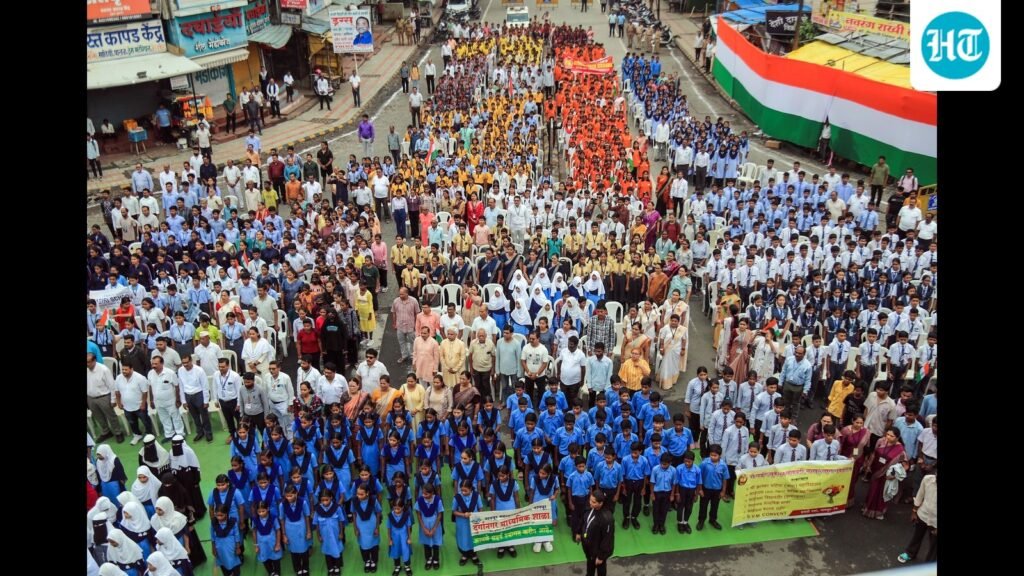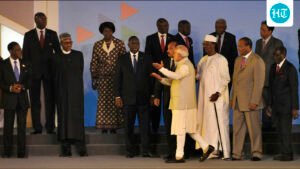
In the long and inspiring journey of our nation’s history, there have been many defining moments when songs and art became the soul of movements, shaping collective emotion into action. Be it the war songs of Chatrapati Shivaji Maharaj’s army, the patriotic anthems sung during the freedom struggle, or the songs of resistance sung by the youth during the Emergency, songs have always awakened collective consciousness and unity in India society.

Among them stands Vande Mataram, Bharat’s national song, whose story did not begin on a battlefield but in the calm yet resolute mind of a scholar, Bankim Chandra Chattopadhyay. In 1875, on the auspicious day of Jagaddhatri Puja ,Kartik Shukla Navami or Akshaya Navami), he composed a hymn that would become the eternal anthem of the nation’s freedom. In those sacred lines, he drew inspiration from Bharat’s deepest civilizational roots, from the Atharva Veda‘s declaration,Mother Earth, Son’s Aham Prithivyah” (“The earth is my mother, and I am her son”), to the Devi Mahatmya‘s invocation of the Divine Mother.
Bankim babuHis words were both a prayer and a prophecy. Vande Mataram was not merely a national song or the lifeblood of the freedom movement. It was Bankim Chandra’s proclamation of cultural nationalism. It reminded us that Bharat is not just a geographical territory, but a geo-cultural civilization, united not by boundaries drawn on a map but by shared culture, memory, sacrifice, valor and motherhood. This is not merely land; it is a tirthaa sacred soil sanctified by devotion and duty.
As Maharshi Aurobindo described, Bankim was a sage of modern Bharat who reawakened the soul of the nation through his words. His Anandamath was not just a novel; it was a mantra in prose that stirred a sleeping nation to rediscover its divine strength. In one of his letters, Bankim babu wrote, “I shall have no objection if all my works are lost in the Ganga; this one hymn alone will live through eternity. It will be a great song and will win the hearts of the people.”
These words were prophetic. Written during one of the darkest hours of colonial rule, Vande Mataram became the dawn-song of awakening, a hymn that fused cultural pride with civilizational nationalism. Only an individual brimming with devotion to the motherland could have written such lines.
In 1896, Rabindranath Tagore set Vande Mataram to tune and sang it at the Calcutta Congress session, giving the hymn its voice and immortality. It transcended barriers of language and region, echoing across India. In Tamil Nadu, Subramania Bharati rendered it in Tamil and in Punjab, revolutionaries sang it in defiance of British rule.
During the partition of Bengal in 1905, when rebellion swept across the province, the British banned public recitations of Vande Mataram. On April 14, 1906, in Barisal, thousands defied the order. When the police charged upon the peaceful crowd, men and women alike stood bleeding on the streets, shouting Vande Mataram in unison.
From there, this sacred chant traveled with the revolutionaries of the Ghadar Party to California. It echoed in the ranks of the Azad Hind Fauj as Netaji’s soldiers marched from Singapore. It ran through the Royal Indian Navy mutiny of 1946, when Indian sailors hoisted the tricolor on British warships. From Khudiram Bose to Ashfaqulla Khan, from Chandrashekhar Azad to Tiruppur Kumaran, the slogan echoed as one. It was no longer just a song; it had become the collective voice of Bharat’s soul. Mahatma Gandhi himself admitted that Vande Mataram had “the magical power to stir even the most dormant blood”. It united liberals and revolutionaries, scholars and soldiers alike. As Maharishi Aurobindo declared, it was “the mantra of Bharat’s rebirth”.
On October 26, during his Mann Ki Baat address, Prime Minister Narendra Modi reminded the nation of Vande Mataram’s glorious legacy. To mark 150 years of this immortal hymn, the Government of India has decided to organize nationwide programs for a year starting November 7. Through these celebrations, the full version of Vande Mataram will resonate across the nation once again, inspiring the youth to internalize the idea of cultural nationalism.
As we celebrate Bharat Parv and pay homage to Sardar Vallabhbhai Patel on his birth anniversary, we are reminded of how Sardar’s unification of Bharat was the living embodiment of the spirit of Vande Mataram. This song is not merely a remembrance of the past but also a call to the future. Even today, Vande Mataram inspires our vision of a Viksit Bharat 2047, a confident, self-reliant and resurgent Bharat. It is the anthem of our civilizational self-belief, and it is now our responsibility to transform that spirit into action.
Vande Mataram is the song of freedom, the spirit of unyielding resolve and the first mantra of India’s awakening. Words born from the soul of a nation never die; they live on, resonating through ages and generations. This sacred chant will continue to echo through eternity, reminding us to view our history, our culture, our values and our traditions through the vision of Bharatiyata (Indianness).
Vande Mataram!
Amit Shah is Union home minister and minister of cooperation. The views expressed are personal






